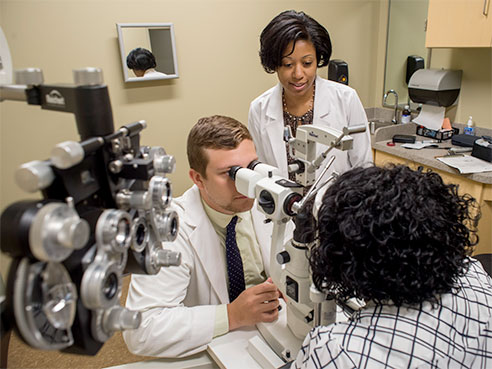 Vision disorders and eye disease have become a major public health concern. The University of Alabama at Birmingham is providing optometrists with training and experience in public health needed to assess community needs for vision care services through a dual Doctor of Optometry and Master of Public Health degree.
Vision disorders and eye disease have become a major public health concern. The University of Alabama at Birmingham is providing optometrists with training and experience in public health needed to assess community needs for vision care services through a dual Doctor of Optometry and Master of Public Health degree.
“We are proud to partner with the School of Public Health to offer the joint OD/MPH program,” said Kelly K. Nichols, O.D., MPH, Ph.D., dean of UAB’s School of Optometry. “We believe that by providing our students the opportunity to receive a dual degree from two of the nation’s leading programs, our UAB graduates will be well-equipped to succeed in both clinical care and health care leadership. As the landscape of health care continues to evolve, it is important to not only train students for clinical excellence, but to also prepare them to become leaders and forward thinkers in the overall health care environment.”
Optometrists in the dual-degree program will be able to better determine factors that contribute to treatment and prevention of vision care services, develop and apply quality assurance systems, participate and provide leadership in health-related agencies, and foster public awareness of the need for vision care.
“Vision services are important to communities throughout the region,” said Max Michael, M.D., dean of UAB’s School of Public Health. “Offering a degree that helps prepare optometrists with the knowledge to improve vision in these communities empowers these students to go beyond the day-to-day clinical aspects of optometry.”
| Optometrists in the dual-degree program will be able to better determine factors that contribute to treatment and prevention of vision care services, develop and apply quality assurance systems, participate and provide leadership in health-related agencies, and foster public awareness of the need for vision care. |
Students in the concurrent OD/MPH program will develop, administer and evaluate eye and vision health programs in research projects, as well as design and conduct epidemiological field studies, use statistical methods in data analysis of case-control and cohort studies, develop and implement vision health education programs, and develop occupational health and eye safety programs.
The curriculum of the optometry professional program includes an additional 43 credit hours in the MPH program with coursework in biostatistics, epidemiology, environmental health sciences, public health policy and more.
Admission into the OD/MPH program includes enrollment in the School of Optometry, an interview with the OD/MPH committee, approval and recommendation from the School of Optometry, and application and acceptance into the School of Public Health.